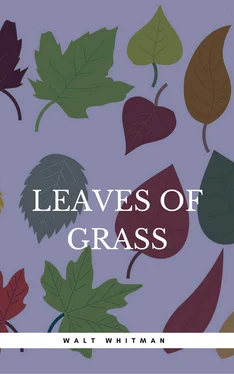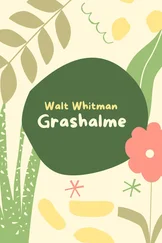Walt Whitman - Leaves of Grass
Здесь есть возможность читать онлайн «Walt Whitman - Leaves of Grass» — ознакомительный отрывок электронной книги совершенно бесплатно, а после прочтения отрывка купить полную версию. В некоторых случаях можно слушать аудио, скачать через торрент в формате fb2 и присутствует краткое содержание. ISBN: , Жанр: Языкознание, Критика, на английском языке. Описание произведения, (предисловие) а так же отзывы посетителей доступны на портале библиотеки ЛибКат.
- Название:Leaves of Grass
- Автор:
- Жанр:
- Год:неизвестен
- ISBN:9782377930524
- Рейтинг книги:4 / 5. Голосов: 1
-
Избранное:Добавить в избранное
- Отзывы:
-
Ваша оценка:
- 80
- 1
- 2
- 3
- 4
- 5
Leaves of Grass: краткое содержание, описание и аннотация
Предлагаем к чтению аннотацию, описание, краткое содержание или предисловие (зависит от того, что написал сам автор книги «Leaves of Grass»). Если вы не нашли необходимую информацию о книге — напишите в комментариях, мы постараемся отыскать её.
Leaves of Grass — читать онлайн ознакомительный отрывок
Ниже представлен текст книги, разбитый по страницам. Система сохранения места последней прочитанной страницы, позволяет с удобством читать онлайн бесплатно книгу «Leaves of Grass», без необходимости каждый раз заново искать на чём Вы остановились. Поставьте закладку, и сможете в любой момент перейти на страницу, на которой закончили чтение.
Интервал:
Закладка:
Be careful, darkness! already, what was it touched me?
I thought my lover had gone, else darkness and he are one,
I hear the heart-beat, I follow, I fade away.
O hot-cheeked and blushing! O foolish hectic!
O for pity’s sake, no one must see me now! my clothes were stolen while I was abed,
Now I am thrust forth, where shall I run?
Pier that I saw dimly last night, when I looked from the windows!
Pier out from the main, let me catch myself with you and stay! I will not chafe you,
I feel ashamed to go naked about the world.
I am curious to know where my feet stand—and what this is flooding me, childhood or manhood—and the hunger that crosses the bridge between.
The cloth laps a first sweet eating and drinking,
Laps life-swelling yolks—laps ear of rose-corn, milky and just ripened;
The white teeth stay, and the boss-tooth advances in darkness,
And liquor is spilled on lips and bosoms by touching glasses, and the best liquor afterward.
I descend my western course, my sinews are flaccid,
Perfume and youth course through me, and I am their wake.
It is my face yellow and wrinkled, instead of the old woman’s,
I sit low in a straw-bottom chair, and carefully darn my grand-son’s stockings.
It is I too, the sleepless widow looking out on the winter midnight,
I see the sparkles of starshine on the icy and pallid earth.
A shroud I see, and I am the shroud—I wrap a body and lie in the coffin,
It is dark here underground, it is not evil or pain here, it is blank here, for reasons.
It seems to me that everything in the light and air ought to be happy,
Whoever is not in his coffin and the dark grave, let him know he has enough.
I see a beautiful gigantic swimmer swimming naked through the eddies of the sea,
His brown hair lies close and even to his head, he strikes out with courageous arms, he urges himself with his legs,
I see his white body, I see his undaunted eyes,
I hate the swift-running eddies that would dash him head-foremost on the rocks.
What are you doing, you ruffianly red-trickled waves?
Will you kill the courageous giant? Will you kill him in the prime of his middle age?
Steady and long he struggles,
He is baffled, banged, bruised—he holds out while his strength holds out,
The slapping eddies are spotted with his blood—they bear him away, they roll him, swing him, turn him,
His beautiful body is borne in the circling eddies, it is continually bruised on rocks,
Swiftly and out of sight is borne the brave corpse.
I turn, but do not extricate myself,
Confused, a past-reading, another, but with darkness yet.
The beach is cut by the razory ice-wind, the wreck-guns sound,
The tempest lulls—the moon comes floundering through the drifts.
I look where the ship helplessly heads end on—I hear the burst as she strikes—I hear the howls of dismay—they grow fainter and fainter.
I cannot aid with my wringing fingers,
I can but rush to the surf, and let it drench me and freeze upon me.
I search with the crowd—not one of the company is washed to us alive;
In the morning I help pick up the dead and lay them in rows in a barn.
Now of the old war-days, the defeat at Brooklyn,
Washington stands inside the lines, he stands on the entrenched hills amid a crowd of officers,
His face is cold and damp, he cannot repress the weeping drops, he lifts the glass perpetually to his eyes, the color is blanched from his cheeks,
He sees the slaughter of the southern braves confided to him by their parents.
The same, at last and at last, when peace is declared,
He stands in the room of the old tavern—the well-beloved soldiers all pass through,
The officers speechless and slow draw near in their turns,
The chief encircles their necks with his arm, and kisses them on the cheek,
He kisses lightly the wet cheeks one after another—he shakes hands, and bids good-bye to the army.
Now I tell what my mother told me today as we sat at dinner together,
Of when she was a nearly grown girl living home with her parents on the old homestead.
A red squaw came one breakfast-time to the old homestead,
On her back she carried a bundle of rushes for rush-bottoming chairs,
Her hair, straight, shiny, coarse, black, profuse, half-enveloped her face,
Her step was free and elastic, her voice sounded exquisitely as she spoke.
My mother looked in delight and amazement at the stranger,
She looked at the beauty of her tall-borne face, and full and pliant limbs,
The more she looked upon her she loved her,
Never before had she seen such wonderful beauty and purity,
She made her sit on a bench by the jamb of the fire-place, she cooked food for her,
She had no work to give her, but she gave her remembrance and fondness.
The red squaw staid all the forenoon, and toward the middle of the afternoon she went away,
O my mother was loth to have her go away!
All the week she thought of her—she watched for her many a month,
She remembered her many a winter and many a summer,
But the red squaw never came, nor was heard of there again.
Now Lucifer was not dead—or if he was, I am his sorrowful terrible heir!
I have been wronged—I am oppressed—I hate him that oppresses me!
I will either destroy him, or he shall release me.
Damn him! how he does defile me!
How he informs against my brother and sister, and takes pay for their blood!
How he laughs when I look down the bend, after the steamboat that carries away my woman!
Now the vast dusk bulk that is the whale’s bulk, it seems mine,
Warily, sportsman! though I lie so sleepy and sluggish, my tap is death.
A show of the summer softness! a contact of something unseen! an amour of the light and air!
I am jealous, and overwhelmed with friendliness,
And will go gallivant with the light and air myself,
And have an unseen something to be in contact with them also.
O love and summer! you are in the dreams, and in me,
Autumn and winter are in the dreams—the farmer goes with his thrift,
The droves and crops increase, the barns are well-filled.
Elements merge in the night, ships make tacks in the dreams, the sailor sails, the exile returns home,
The fugitive returns unharmed, the immigrant is back beyond months and years,
The poor Irishman lives in the simple house of his childhood with the well-known neighbors and faces,
They warmly welcome him, he is bare-foot again, he forgets he is well-off;
The Dutchman voyages home, and the Scotchman and Welchman voyage home, and the native of the Mediterranean voyages home,
To every port of England, France, Spain, enter well-filled ships,
The Swiss foots it toward his hills, the Prussian goes his way, the Hungarian his way, the Pole his way,
The Swede returns, and the Dane and Norwegian return.
The homeward bound, and the outward bound,
The beautiful lost swimmer, the ennuyee, the onanist, the female that loves unrequited, the money-maker,
The actor and actress, those through with their parts, and those waiting to commence,
The affectionate boy, the husband and wife, the voter, the nominee that is chosen, and the nominee that has failed,
The great already known, and the great any-time after today,
The stammerer, the sick, the perfect-formed, the homely,
The criminal that stood in the box, the judge that sat and sentenced him, the fluent lawyers, the jury, the audience,
The laugher and weeper, the dancer, the midnight widow, the red squaw,
The consumptive, the erysipalite, the idiot, he that is wronged,
The antipodes, and every one between this and them in the dark,
I swear they are averaged now—one is no better than the other,
The night and sleep have likened them and retored them.
Интервал:
Закладка:
Похожие книги на «Leaves of Grass»
Представляем Вашему вниманию похожие книги на «Leaves of Grass» списком для выбора. Мы отобрали схожую по названию и смыслу литературу в надежде предоставить читателям больше вариантов отыскать новые, интересные, ещё непрочитанные произведения.
Обсуждение, отзывы о книге «Leaves of Grass» и просто собственные мнения читателей. Оставьте ваши комментарии, напишите, что Вы думаете о произведении, его смысле или главных героях. Укажите что конкретно понравилось, а что нет, и почему Вы так считаете.












